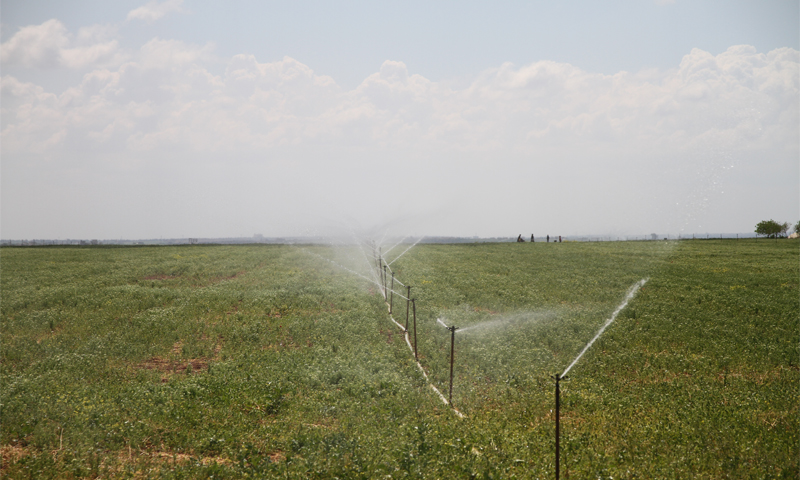Printed Edition ‖ No.: 221
Enab Baladi – Idlib
The rising price of diesel has increased the suffering of farmers in the North of Syria, and led to reduced yields of agricultural crops, at a time when farmers are watering and harvesting their land.
Muhammad Haj Ali owns agricultural land in the Eastern countryside of Idlib and explains to Enab Baladi the damage caused by the rising price of fuel, “My land needs five hours of water every two days to irrigate well, and it costs me two hundred liters of fuel to run the water pump engine. Since I grow wheat, I need a full month of water until the harvest.”
With a rise in prices of 30%, according to the estimates of Haj Ali, the cost grows to more than four hundred Syrian pounds, meaning a dramatic loss of profits.
The reason for the high price of diesel in the North of Syria is the Islamic State’s cutting off of the road for trucks headed to areas previously under the control of the opposition, but after the opening of the road by the Islamic State, the control of the road heading to the town of Dara Aza moved into the hands of Democratic Union Party (Kurdish).
The price of a liter of diesel ranges between 400 and 450 Syrian pounds, while the price of benzene reaches 550 pounds in the liberated areas of Northern Syria.
The Biggest Loss for the Guarantors of Land
Ahmad al-Sarmeeny, a farmer from the countryside of Idlib says that some farmers reach a level in farming their land after which they implement their equity capital, preventing them from finishing the season, they proceed to offer the land to a guarantor to invest, paying a sum of money to the owner of the land, as opposed to watering and harvesting it and reaping the earnings of the crop without the land owner intervening.
“Here is the heart of the problem,” according to al-Sarmeeny, who explains, “to insure that the land completes evaluation at the expected cost, according to the price at the time of guarantee, for example the investor estimates necessary costs to complete watering and harvesting and assesses the amount according to the price of the liter, but when the price of a liter of diesel weakens he will face a real calamity because he will face extra cost and will without fail experience losses.”
The Damage caused to the consumers
Al-Sarmeeny adds that land owners specialized in growing vegetables, which are harvested almost daily, did not suffer large losses. They sell their products according to costs and market prices that rise with the rise in diesel, but the customer suffers here because he is forced to buy at the heightened price.
It is possible that this problem affects the sellers as well; when prices rise sales will move accordingly, forcing sellers to sometimes sell at a loss to avoid damaging vegetables.
Muhammad al-Hasan, from the town of Tftanaz, says that most of the farmers in the town of Tftanaz store diesel during periods when the price of a liter is steady and stable to avoid these problems; in this way the crops that are harvested one time did not suffer any losses, and with vegetables there is a profit to the farmer.
What is behind fluctuating prices at the market?
Bassam Al Hamwy, a graduate of the agricultural institute in the city of Hama, explains to Enab Baladi that the problem is summed up in the presence of agricultural land that was harvested before the rise in diesel prices, while there is still land being watered now.
The farmers that harvested early, are selling at a lower price than those who are watering now, and this is the official reason for fluctuating prices in the market, according to Al Hamwey, who points out that, “the presence of material of the same type and quality at different prices perhaps forces farmers who own crops with rising prices to sell their crops for less than their cost, or to sell what they harvested early for raised prices reaping astronomical profit.”
